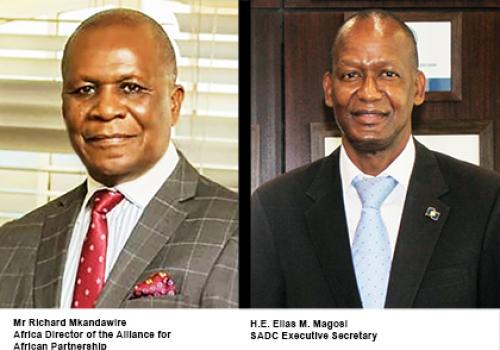The Southern African Development Community (SADC) Executive Secretary, His Excellency Mr Elias M. Magosi, has said SADC considers universities as catalysts and key players in learning environments, pillars of innovation, fresh thinking and leaders in areas of research, technological advancement and development.
H.E Magosi was speaking during a virtual meeting on 20th October 2021, hosted by the Alliance for African Partnership (AAP).
“With support from various partners such as institutions of higher learning, tertiary and universities, the SADC Region is working towards finding solutions to address many challenges like youth unemployment, inequalities, marginalised members of communities and lack of women participation at various levels, and is focused on closing the knowledge gap and bringing those disadvantaged closer to mainstream economic development,” H.E Magosi said.
AAP is a consortium founded by Michigan State University (MSU) in collaboration with 10 African universities to collaborate in addressing global challenges and to strengthen capacities of institutions of higher learning including centres of excellence, advanced research institutes and think-tanks in support of the implementation of SADC development frameworks.
The Executive Secretary commended AAP for its interest to contribute to the Region, highlighting its potential key role in building capacity for SADC universities in the areas of research and education services; support to climate change adaptation and mitigation; and development of mechanisms of engagement.
The Africa Director of Alliance for African Partnership (AAP), and Chairperson for Planning Commission for the Republic of Malawi, Prof. Richard Mkandawire, thanked the Executive Secretary for being eager and willing to engage through deepening collaboration and also made emphasis on the enthusiasm demonstrated by his organisation to make contribution on a whole range of issues and disciplines, and building linkages through understanding and identifying common and core areas to exploit.
He stated that there is an opportunity to use universities in the network and other universities in the Region to foster the transition of Member States into a knowledge economy, by making a meaningful contribution towards the advancement of SADC’s development frameworks such as the SADC Regional Indicative Strategic Development Plan (RISDP) 2020–2030.
Prof. Mkandawire further pointed out the need for SADC to have specialised institutions that will spearhead the creation and dissemination of knowledge and training qualified personnel specialised in technical fields, and called upon universities to redefine a regional programme on youth employment.
The other presentations were received from the vice chancellors and representatives from universities in the SADC Region who shared insights on potential areas of collaboration which were envisaged as important areas of focus. These were received from the Vice Chancellor of the University of Botswana, Prof. David Norris; Vice Chancellor of Lilongwe University of Agriculture and Fisheries, Professor Emmanuel Kaunda; Research Fellow in Residence with focus on Future Africa at the Centre for Advancement of Scholarship at the University of Pretoria, Prof Frans Swanepoel; and Director of Internationalisation, Convocation and Advancement at the University of Dar es Salaam, Dr Lulu Kaaya.
The speakers gave an overview of strategic and programmatic areas of collaboration areas on inclusive health services; industrialised agriculture; management of climate change; human capital growth and development; and significant strengthening of post graduate education; centres of excellence and innovation hubs; as well as development of youth-targeted programmes.
The SADC Executive Secretary was accompanied by the Director of Policy Planning and Resources Mobilisation, Dr Mubita Luwabelwa; Director of Social and Human Development, Ms Duduzile Simelane; and the Director of Food Agriculture and Natural Resources, Mr Domingos Gove, among other Secretariat staff.

